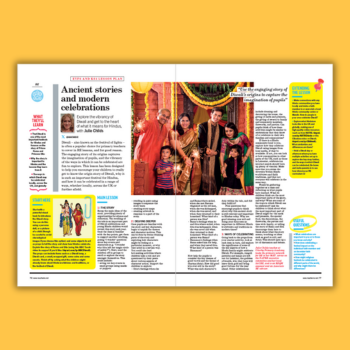PDF lesson plan
KS1
Years 1-2
Use this Diwali KS1 lesson plan to teach your pupils about one of the most important festivals for Hindus.
Diwali – also known as the festival of lights – is often a popular choice for primary teachers to cover in RE lessons, and for good reason.
The engaging story of its origins captures the imagination of pupils, and the vibrancy of the ways in which it can be celebrated are fun to explore.
This lesson aims to help you encourage your children to really get to know the origin story of Diwali. It covers why it is such an important festival for Hindus, and the range of celebrations that take place; whether locally, across the UK or further afield.
What they’ll learn
- That Diwali is one of the most important festivals for Hindus and focuses on the story of Prince Rama and Princess Sita.
- Why the story is important to Hindus and the lessons they learn from it.
- The ways in which Hindu communities may celebrate Diwali locally, across the UK, and globally.
Starter activity – Diwali KS1
Start with a powerful visual hook to introduce the Diwali story.
You can do this using a persona doll, or a picture of a child (though be careful to avoid stereotypical images if you choose this option). Add in some objects to act as props to tell the story and show how Hindus celebrate.
Explain the story of Rama and Sita (using this BBC Teach video to support if you’d like).
The props can include items such as a Diwali lamp, a Diwali card, a small, wrapped gift, coins and sweets.
Finish off by asking what the children might already know about Hindu worldviews and traditions, or the festival of Diwali.
KS1 RE guidance
The non-statutory guidance for RE states that:
- Pupils should develop understanding of concepts and mastery of skills to make sense of religion and belief, at an appropriate level of challenge for their age.
- RE should provide opportunities for pupils to develop positive attitudes and values. It should also reflect and relate their learning in RE to their own experience.
- Building on the statutory requirements, there should be a wide ranging study of religion and belief across the key stages.
- Not all religions need to be studied at the same depth or in each key stage. However, all that are studied should be studied in a way that is coherent and promotes progression.
- The breadth of study should take account of the four levels of community cohesion. All maintained schools are now obliged to promote these. Decisions by SACREs and ASCs about the religions, other than Christianity, to be studied, should take account of:
– the balance of religion within the school community
– the community within which the school is located
– the UK community
– the global community.
Julie Childs teaches at Utterby Primary Academy. She leads the primary network for RE in her MAT, serves on the NATRE executive committee and her local SACRE, and is an REQM assessor and an associate RE adviser. Browse more Diwali activities.

Similar resources
- Shakespeare rap – Write, perform and master metre
- Stone Age to Iron Age – KS2 medium-term plan with resources
- Buddhism charity KS2 – Explore dāna (Buddist generosity concept)
- Solubility KS2 – Investigate solubility with common ingredients
- Fast fashion effects on environment – Fashion show art lesson










